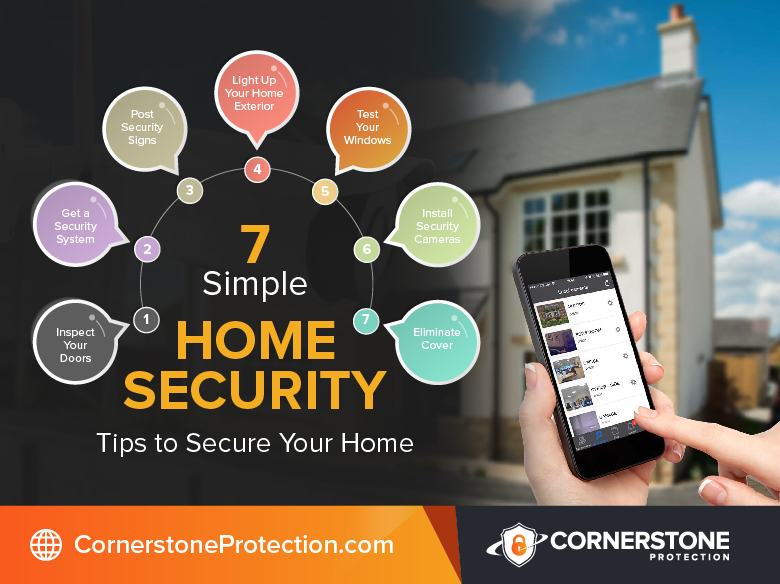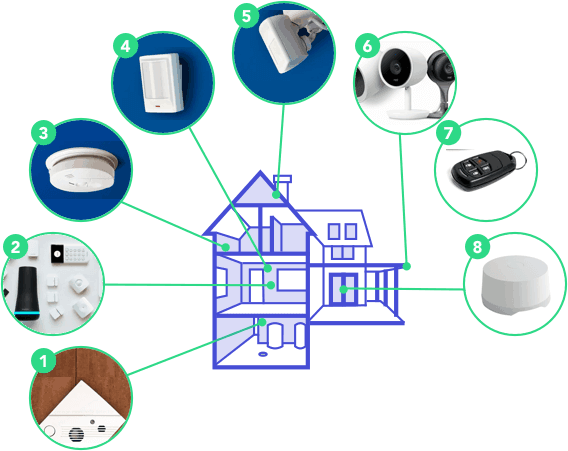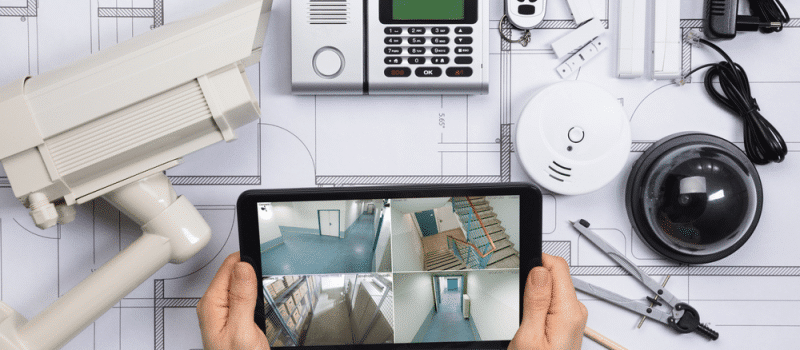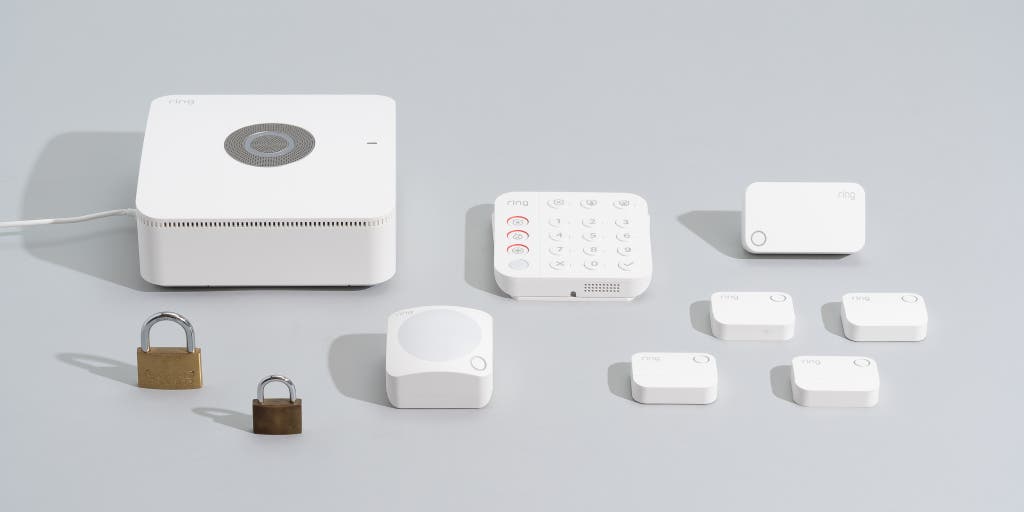Imagine a world where you can leave your home without a worry, knowing that it is protected and monitored no matter where you are. Having a security system for your home is not just about preventing break-ins; it is a risk management strategy that brings peace of mind. In this article, we will explore how having a security system for your home can significantly reduce the risk of theft, vandalism, and other security concerns. From the latest home automation ideas to cost-effective installation options, we will guide you through the essential steps to safeguard your sanctuary and create a secure haven for you and your loved ones. Say goodbye to sleepless nights and hello to enhanced home security.

Understanding Home Security Systems
When it comes to keeping your home and loved ones safe, a home security system is an essential investment. But what exactly is a home security system? Simply put, it is a network of devices and components that work together to protect your home from various risks, such as burglary, fire, and even environmental hazards.
Types of Home Security Systems
There are several types of home security systems available in the market today. The most common ones include:
-
Monitored Systems: These systems are connected to a monitoring center that keeps a watchful eye on your home 24/7. In case of an emergency, such as a break-in or fire, the monitoring center will immediately alert the authorities and provide them with necessary information.
-
Unmonitored Systems: With unmonitored systems, you don’t have a professional monitoring service. Instead, these systems rely on loud alarms or notifications sent to your smartphone to inform you of any potential threats. While they may be more cost-effective, they require your direct attention and action.
-
Wireless Systems: Wireless home security systems have become increasingly popular due to their convenience and ease of installation. These systems use wireless technology to connect all the components, eliminating the need for extensive wiring throughout your home.
-
DIY Systems: Do-it-yourself home security systems allow homeowners to install and customize their own security solutions. These systems typically come with user-friendly installation instructions and can be easily tailored to fit specific needs.
Important Features for Home Security Systems
When choosing a home security system, there are certain features you should prioritize to ensure maximum protection. These features include:
-
Video Surveillance: A security system with video surveillance capabilities allows you to monitor your home remotely, keeping an eye on any suspicious activity in real-time. Having recorded video footage can also be invaluable in the event of a break-in or other incident.
-
Motion Sensors: Motion sensors are designed to detect movement within a specified area. They can trigger an alarm or send an alert to your smartphone whenever unexpected motion is detected, alerting you to potential threats.
-
Alarm Systems: An audible alarm system is an effective deterrent for burglars and intruders. These systems produce a loud sound when activated, drawing attention to the situation and potentially scaring away any unwanted individuals.
-
smart lighting: Smart lighting, such as under cabinet and wall LED lights, can be integrated with your home security system to enhance safety. These lights can be programmed to turn on automatically when motion is detected, creating the illusion that someone is at home even when you’re not.
Role of a Security System in Risk Management
A security system plays a crucial role in risk management for your home. By installing a comprehensive security system, you are effectively mitigating potential risks and protecting yourself from harm.
How Security Systems Act as Risk Management Tools
Home security systems act as risk management tools by:
-
Providing a Deterrent: The presence of visible security cameras, motion sensors, and alarms can deter potential burglars or intruders from targeting your home. Criminals are less likely to target a property that has effective security measures in place.
-
Detecting Threats: Security systems are designed to detect potential threats before they escalate into major problems. With features like motion sensors and surveillance cameras, you can identify suspicious activities in real-time and take immediate action.
-
Enabling Remote Monitoring: Many modern security systems offer remote monitoring capabilities, allowing you to keep an eye on your home even when you’re away. This constant vigilance helps you identify any risks or emergencies, such as a fire or water leak, and take appropriate action promptly.
Importance of Risk Management for Home Security
Risk management is crucial for home security because it helps you anticipate, evaluate, and mitigate potential dangers. By actively managing risks, you are taking proactive steps to protect your home and loved ones. A comprehensive security system acts as a crucial element of risk management, providing you with the tools and resources needed to minimize threats and respond effectively in case of emergencies.
Cost of Home Security System Installation
Home security system installation costs can vary depending on several factors, including the size of your home, the complexity of the system, and the specific features you opt for.
Average Cost of Home Security System Installation
On average, homeowners can expect to spend between $500 and $1,500 for a basic home security system installation. This typically includes the cost of the equipment, labor, and any additional features you choose. It’s important to note that this is a rough estimate, and prices can vary significantly based on your specific requirements and the provider you choose.
Ways to Save on Home Security System Installation
While investing in a reliable home security system is essential, there are ways to save on installation costs. Consider the following tips:
-
Research and Compare Prices: Take the time to research different home security system providers and compare their prices, packages, and customer reviews. By doing so, you can find the best value for your budget.
-
Opt for DIY Installation: If you’re handy and comfortable with technology, consider opting for a do-it-yourself (DIY) installation. Many home security systems offer DIY options that can save you money on professional installation fees.
-
Bundle Services: Some home security system providers offer bundled services, such as combining home security with internet or phone services. These packages often provide discounts and cost savings compared to purchasing individual services separately.
-
Check for Special Offers and Discounts: Keep an eye out for special offers, promotions, or discounts that providers may be offering. These deals can help reduce the overall cost of installation and ongoing monitoring fees.
By being proactive and exploring these cost-saving options, you can ensure you get the best possible value without compromising on the level of security for your home.
Components of a Smart Home Security System
A smart home security system encompasses various components that work together to create a comprehensive security solution. These components include:
Smart Cameras
Smart cameras are a key component of modern home security systems. They provide visual surveillance by capturing video footage of your home’s surroundings. These cameras are often equipped with advanced features such as high-definition resolution, night vision capabilities, and wide-angle views. Some models also offer facial recognition technology, allowing you to easily identify people entering your property.
Motion Sensors
Motion sensors are designed to detect movement within a designated area. They can be strategically placed around the perimeter of your home, as well as inside key areas. When triggered, motion sensors can activate alarms or send alerts to your smartphone, notifying you of potential intrusions or unauthorized entry.
Alarm Systems
Alarm systems are a vital component of any home security system. Typically, they consist of a control panel, sensors, and an audible alarm. When a sensor detects a breach, such as a door or window being opened, the alarm system is activated, emitting a loud sound to alert you and potentially scare off intruders.
Smart Lighting
Smart lighting, such as under cabinet and wall LED lights, can enhance the security of your home. These lights can be integrated with your security system and programmed to turn on automatically when motion is detected. This not only illuminates the area but also gives the impression that someone is home, even if you’re away.

Brands Offering Quality Home Security Systems
When it comes to choosing a home security system, it’s important to select a reputable brand that offers reliable products and services. Here are a few top brands known for their quality home security systems:
Brinks Home Security
Brinks Home Security is a trusted brand that has been protecting homes for over 160 years. They offer a variety of security solutions, including comprehensive packages that include professional monitoring, video surveillance, motion sensors, and alarm systems. Brinks Home Security systems are known for their reliability and ease of use.
Ring Smart Lighting
Ring is a well-known brand in the home security industry, known for its innovative smart doorbell cameras. In addition to their doorbell cameras, Ring also offers a wide range of smart lighting solutions. These smart lights can be controlled remotely, integrated with other Ring devices, and programmed to enhance the security of your home.
Brilliant Home Control
Brilliant Home Control offers advanced home automation solutions that can integrate seamlessly with your home security system. Their products include touchscreen control panels that allow you to manage your security settings, lighting, and other smart devices from a single interface. With Brilliant Home Control, you can easily customize and enhance the security features of your home.
Demystifying Home Automation Ideas
Home automation is an increasingly popular trend, allowing homeowners to control various aspects of their homes using technology. Here are some cool home automation ideas for 2023, as well as specific ideas for popular automation platforms such as Apple, Google, and Alexa:
Cool Home Automation Ideas for 2023
-
Voice-Activated Security: With advancements in voice recognition technology, you can now control your home security system using voice commands. Simply use your voice to arm or disarm your system, check the status of your cameras, or receive alerts.
-
Biometric Access Control: Biometric access systems allow you to use fingerprints or facial recognition as a secure means of accessing your home. This high-tech solution adds an extra layer of security by ensuring only authorized individuals can enter.
Apple Home Automation Ideas
-
Siri Integration: Apple’s voice assistant, Siri, can be integrated with various home automation devices and systems. Use Siri to control your security system, adjust lighting, or even lock doors — all with a simple voice command.
-
HomeKit Automation: Apple’s HomeKit allows you to create custom automation scenarios for your home. For example, you can set up a rule that automatically activates your security system, locks doors, and turns off lights when you leave home.
Google Home Automation Ideas
-
Voice Control with Google Assistant: Google Assistant enables voice-controlled automation for your home security system. You can use voice commands to arm or disarm your system, receive real-time notifications, and control other smart devices in your home.
-
Routine-based Automation: Google Home allows you to create routines that automate specific actions based on predefined triggers. For example, you can set up a routine that activates your security system, adjusts the thermostat, and turns off lights when you say “Goodnight.”
Alexa Home Automation Ideas
-
Alexa Guard: Alexa Guard is a feature that turns your Alexa-enabled devices into home security systems. It listens for specific sounds, such as breaking glass or smoke alarms, and sends alerts to your smartphone or activates your security system.
-
Security System Integration: Alexa can be integrated with various home security systems, allowing you to control your security features using voice commands. You can arm or disarm your system, check camera feeds, and even receive crime alerts.

Benefits of Owning a Home Security System
Investing in a home security system offers numerous benefits beyond just bolstering the security of your home. Here are some key advantages of owning a home security system:
Provides You with Peace of Mind
One of the most significant benefits of having a home security system is the peace of mind it offers. Knowing that your home and loved ones are protected can alleviate stress and allow you to focus on other aspects of your life. Whether you’re at work, on vacation, or simply sleeping soundly at night, a security system can provide the confidence that your home is secure.
Can Decrease Insurance Costs
Many insurance providers offer discounts on home insurance premiums for homeowners with security systems. By reducing the risk of burglary and other incidents, a home security system demonstrates to insurers that your home is less likely to experience costly losses. Contact your insurance provider to inquire about potential savings you may qualify for by having a security system in place.
Discourages Burglaries or Intrusions
The mere presence of a home security system can act as a powerful deterrent to potential burglars or intruders. Visible security cameras, motion sensors, and alarm systems make it clear that your home is protected and actively monitored. This, in turn, reduces the likelihood of a break-in, as criminals often target properties that appear less secure.
How a Security System Reduces Risk
A security system plays a crucial role in reducing the overall risk associated with home security. Here’s how it can effectively minimize potential dangers:
Reduction in Instances of Burglary
Studies have consistently shown that homes with security systems are far less likely to be targeted by burglars. The visual presence of security cameras, motion sensors, and alarms acts as a strong deterrent, making criminals think twice before attempting a break-in. With a security system in place, the risk of burglary decreases significantly.
Monitoring of Dangerous Situations
Modern security systems often include 24/7 monitoring services. This means that trained professionals are constantly keeping an eye on your home, ready to respond to any emergencies. Whether it’s detecting a fire or spotting suspicious activity, these monitoring services ensure that potential risks are identified and addressed promptly.
Fast Emergency Response
In the event of a break-in, fire, or any other emergency, a security system can facilitate a quicker response from emergency services. Many home security systems are directly connected to monitoring centers, which can swiftly notify the appropriate authorities. This reduces the response time, increasing the chances of a successful resolution and minimizing potential damage.

Useful Home Security Tips
In addition to investing in a home security system, there are several steps you can take to further enhance the security of your home. Consider these useful home security tips:
Proper Use of Security Systems
Make the most of your home security system by following these best practices:
-
Regularly Test Your System: Ensure that all components of your security system, such as alarms and cameras, are in proper working order. Regularly test your system to verify that it is functioning as expected.
-
Keep Your Security System Updated: Stay updated with the latest firmware and software upgrades for your security system. These updates often include bug fixes and security enhancements, ensuring optimal performance.
-
Secure Access Codes: Protect your security system’s access codes and passwords. Avoid using default or easily guessable codes and change them periodically to maintain security.
Additional Security Measures That Complement Security Systems
Enhance your home security by implementing these supplementary measures:
-
Install Quality Door and Window Locks: Secure your entry points with high-quality locks on doors and windows. Deadbolts, reinforced strike plates, and window locks can significantly improve the physical security of your home.
-
Reinforce Your Home’s Entry Points: Consider reinforcing vulnerable entry points, such as doors and windows, with additional measures like security film, door jammers, or window bars. These physical barriers can deter potential intruders.
-
Maintain Outdoor Lighting: A well-lit exterior can discourage criminals from approaching your property. Install outdoor lighting around your home, paying particular attention to entry points and dark areas.
-
Establish Neighborhood Watch Programs: Get involved in neighborhood watch programs or community groups focused on security. Collaborating with neighbors can create a strong network of support and encourage a safer community environment.
By combining these additional security measures with a comprehensive home security system, you can maximize the safety of your home and minimize potential risks.
Future of Home Security Systems
As technology continues to advance, the future of home security systems looks promising. Here are some trends and advancements to look out for:
Trends in Home Security Systems
-
Integration with Smart Home Devices: Home security systems are increasingly becoming more integrated with other smart home devices, such as thermostats, lighting, and voice assistants. This integration allows for seamless control and automation of various aspects of your home security.
-
Artificial Intelligence (AI) and Machine Learning: AI-powered security systems can learn and adapt to your household’s patterns, making them more efficient and less prone to false alarms. By analyzing data from various sources, AI can detect anomalies and suspicious behavior, enhancing the overall security of your home.
How Technology Advancements, Such as IoT and AI, Impact Home Security
-
Internet of Things (IoT): The IoT enables the interconnection and communication of various devices. In the context of home security systems, IoT allows different components, such as cameras, sensors, and alarms, to work together seamlessly, providing a more robust and integrated security solution.
-
Artificial Intelligence (AI): AI enables home security systems to analyze data, learn patterns, and make intelligent decisions. AI-powered systems can detect unusual behavior, recognize faces, and even predict possible threats, significantly enhancing the effectiveness of home security.
As these and other advancements continue to evolve, the future of home security systems holds immense potential for enhancing the protection and convenience of homeowners worldwide.
